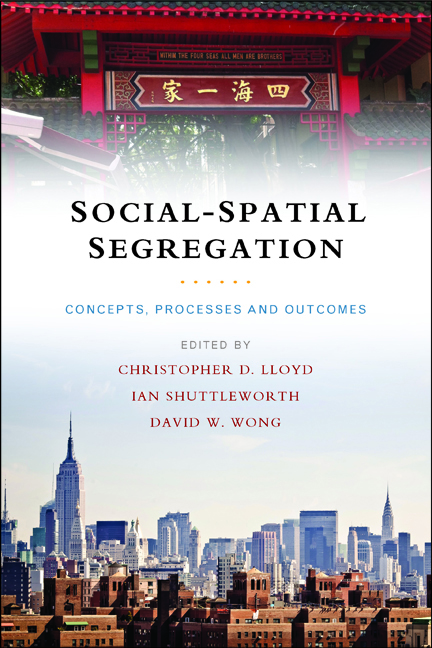five - Micro-geography of segregation: evidence from historical US census data
Published online by Cambridge University Press: 04 March 2022
Summary
Introduction
Segregation, the preferred or imposed separation of individuals in space and/or time, is a phenomenon observed for several traits of self-identity and labelling, including ethnicity, language, religion and economic status. Urban segregation is as old as the history of cities, with evidence indicating that it was practised in such disparate places as Hellenistic Babylon, circa 300 BC (van der Spek, 2009) and pre-Columbian Mesoamerica, circa 100 BC (Cowgill, 1997). Systematic study of segregation is a much more recent endeavour that is conventionally traced back to the Chicago School of Sociology in the first half of the 20th century (Dawkins et al, 2007). In contemporary academic and policy debates, the social phenomenon of segregation is considered an important factor to understand mobility (South and Crowder, 1998), opportunity (Musterd and Andersson, 2005), inequality (Chapter Fifteen, this volume; see also Massey and Fischer, 2000), social coherence (Baum et al, 2010), wellbeing (Chapter Sixteen, this volume; see also Ochieng, 2011), and individual health (Chapter Fourteen, this volume; see also Williams and Collins, 2001). Accordingly, numerous studies have been conducted in order to illuminate the possible existence of population segregation in the context of age (Smith, 1998), income (Chapter Thirteen, this volume; see also Fong and Shibuya, 2000; Feitosa et al, 2007), religion (Lloyd, 2010), and ethnicity (Alba et al, 1997; Wong, 1998), among other characteristics.
Segregation research can broadly be thought of as having two complementary branches, namely, the study of measurement and the study of process. The study of measurement is valuable to identify situations of interest, in particular, evidence of segregation, and to generate hypotheses about the processes that affect segregation (see, for example, Chapter Ten, this volume). The study of process is essential to understand the ways in which segregation originates, and how it is perpetuated, or abated. Research on segregation measurement has in recent years undergone a profound transformation. As chronicled by Gorard and Taylor (2002), segregation was conventionally measured by means of the index of dissimilarity, after the work of Duncan and Duncan (1955a, 1955b). The research of Massey and Denton (1988) on the dimensions of segregation, on the other hand, was hugely influential in clarifying the multidimensional nature of the concept, and the difficulties associated with trying to find an all-encompassing measure of segregation.
- Type
- Chapter
- Information
- Social-Spatial SegregationConcepts, Processes and Outcomes, pp. 91 - 110Publisher: Bristol University PressPrint publication year: 2014
- 1
- Cited by



